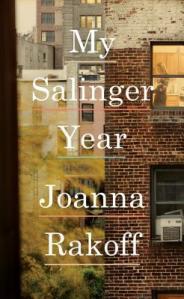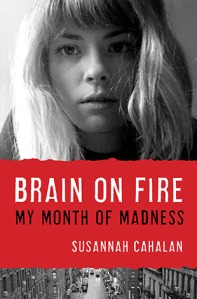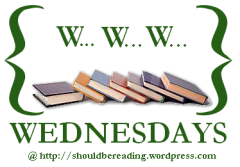Not only is my 2013 off to a very quick start (I’ll never be able to keep up the 10 book/month pace), it’s off to a good one. Of the 10 books I completed in January, most were well above average. A couple surprised me. A couple disappointed me. And all made me glad I love to read.
Fun Home: A Family Tragicomic by Alison Bechdel
4 stars
 A very quick, if mildly disturbing, read. This is my first experience with a graphic-book and I found the illustrations sometimes really added to the limited text,but in some cases stole from the sharp, crisp writing. Bechdel does not shy away from the discomfort inherent in not only her own coming out story, but the complicated back-story of her father’s closeted homosexuality. The complex father-daughter relationship was fascinating to me and I would have liked that to be fleshed out even more (in terms of text). Overall, I was impressed by this memoir.
A very quick, if mildly disturbing, read. This is my first experience with a graphic-book and I found the illustrations sometimes really added to the limited text,but in some cases stole from the sharp, crisp writing. Bechdel does not shy away from the discomfort inherent in not only her own coming out story, but the complicated back-story of her father’s closeted homosexuality. The complex father-daughter relationship was fascinating to me and I would have liked that to be fleshed out even more (in terms of text). Overall, I was impressed by this memoir.
He used his skillful artifice not to make things, but to make things appear to be what they were not.”
The Twelve Tribes of Hattie by Ayana Mathis
4 stars
Previously reviewed
The air would smell like taffy and drying seaweed, and they would wear white, and there would be still more happiness. So much happiness. It was almost as exhausting as this relentless February.”
With or Without You by Domenica Ruta
3.5 stars
Previously reviewed
Is it possible to have nostalgia for a time in which you never lived? I’m sure there is a word for this phenomenon in German — beautiful, absurd, and twenty letters long.”
The Chaperone by Laura Moriarty
3 stars
 I really liked so much of this book (including Elizabeth McGovern’s excellent narration), but it just went on so long. I felt like it had several false endings, places where I was finished but then it kept going. Maybe the problem is just that I didn’t expect an epic when I began. The story covers almost 50 years of Cora’s life in a great deal of detail. And while I find the 20th century interesting background, I was frustrated at Moriarty’s need to touch on so many different “issues” — Prohibition, adoption, gay rights, reproductive rights, suffrage. Add to that, Cora happens to witness or read about dozens of historical events. I began to feel manipulated after a while. What a I loved was the relationship between Cora and Louise Brooks. I would have been much more satisfied had she ended the book after their summer together.
I really liked so much of this book (including Elizabeth McGovern’s excellent narration), but it just went on so long. I felt like it had several false endings, places where I was finished but then it kept going. Maybe the problem is just that I didn’t expect an epic when I began. The story covers almost 50 years of Cora’s life in a great deal of detail. And while I find the 20th century interesting background, I was frustrated at Moriarty’s need to touch on so many different “issues” — Prohibition, adoption, gay rights, reproductive rights, suffrage. Add to that, Cora happens to witness or read about dozens of historical events. I began to feel manipulated after a while. What a I loved was the relationship between Cora and Louise Brooks. I would have been much more satisfied had she ended the book after their summer together.
The young can cut you with their unrounded edges…but they can also push you right up to the window of the future and push you through.”
The Newlyweds by Nell Freudenberger
3.5 stars
Deceptively simple story about a Bengali woman, Amina, who meets her American husband on-line, moves to Rochester and struggles to bring her parents to America. Immigrations, marriage, family, desire, truth are the themes all tangled under the surface story. I liked Amina a lot and thought the author brought up many interesting questions, but the other characters didn’t seem as truthful to me. I couldn’t understand their motivations or transitions,which is what prevents a higher rating. I would read more of this writer.
You thought you were a permanent part of your own experience, the net that held it all together — until you discovered that there were many selves, dissolving into one another so quickly over time that the buildings and trees and even the pavement turned out to have more substance than you did.”
The Casual Vacancy by J.K. Rowling
4 stars
Reviewed previously
You must accept the reality of other people. You think that reality is up for negotiation, that we think it’s whatever you say it is. You must accept that we are as real as you are; you must accept that you are not God.”
Harry Potter and the Goblet of Fire by J.K. Rowling (audio)
4 stars
Another great installment of Harry Potter. I can see that the tone of these novels has really darkened considerably. There were moments when my youngest was truly afraid. It’s quite an accomplishment that, even knowing that Harry will survive, I feel the danger and fear he faces. The suspense and environment are so rich, that “spoilers” don’t even interfere with the drama. Can’t wait to start the next one.
If you want to know what a man’s like, take a good look at how he treats his inferiors, not his equals.”
The Revised Fundamentals of Caregiving by Jonathan Evison
2.5 stars
I really, really wanted to like this book but I couldn’t. In fact, I cared so little about it when it was over that I didn’t write any sort of review or notes and now I can only remember a disabled teenager, a grieving loser-ish thirty-something and a trip in a van where they pick up all sorts of oddballs. It sounds like a premise I’d love (kind of Little Miss Sunshine), but it never came together.
I know I’ve lost my mind. But I’m not concerned, because it’s the first thing I’ve lost in a long time that actually feels good.”
There Once Lived a Girl Who Seduced Her Sister’s Husband, and He Hanged Himself: Love Stories byLudmila Petrushevskaya, Anna Summers (translation)
Dozens of short stories, most about people whose lives are not going to work out no matter what they do or hope for. I’m sure they are a reflection of the author’s Soviet reality, but, not only were they depressing, I never found any one or any moment to hold on to. Reading this was like skipping stones over a very flat, dark, lake. Ultimately unfulfilling. I received a complimentary copy of this book from Penguin Books in exchange for my honest review.
A Red Herring Without Mustard (A Flavia de Luce Mystery #3) by Alan Bradley
4 stars
 While other books were failing me, Flavia was there to bring a smile to my face. As usual, this precocious 11 year-old amateur chemist/detective found herself embroiled in murder and mayhem. While there is a certain formula to all these books, Bradley wisely goes deeper into each character with the succession of novels. We learn more about Flavia each time and get to know more about her long-lost mother Harriet, who posthumously plays a huge role in the emotional undercurrent of this book. The “Buckshaw Chronicles” are a smart, entertaining, emotionally fulfilling series of mysteries. I’m so grateful their interesting titles drew my eye a couple of years ago.
While other books were failing me, Flavia was there to bring a smile to my face. As usual, this precocious 11 year-old amateur chemist/detective found herself embroiled in murder and mayhem. While there is a certain formula to all these books, Bradley wisely goes deeper into each character with the succession of novels. We learn more about Flavia each time and get to know more about her long-lost mother Harriet, who posthumously plays a huge role in the emotional undercurrent of this book. The “Buckshaw Chronicles” are a smart, entertaining, emotionally fulfilling series of mysteries. I’m so grateful their interesting titles drew my eye a couple of years ago.
Whenever I’m with other people, part of me shrinks a little. Only when I am alone can I fully enjoy my own company.”














